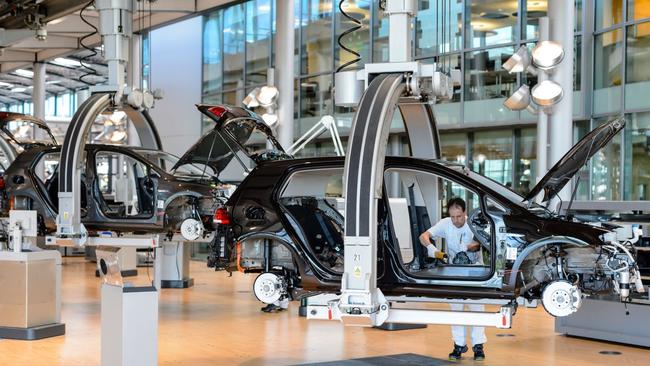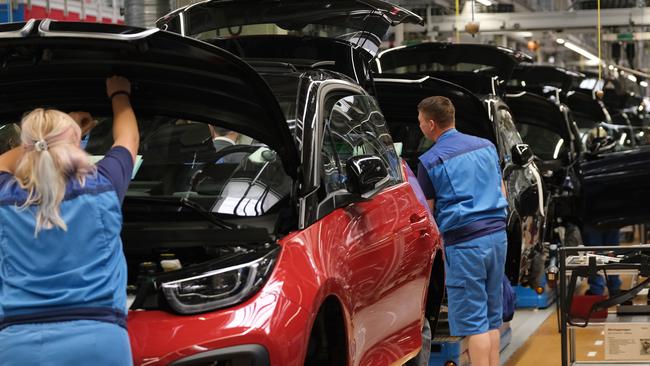Electric cars spark jobs fears in Germany’s auto heartland
In Germany’s car-making heartland, concern is growing about the economic impact of the move to electric vehicles.

Concern is rising in Europe’s automobile heartland about the economic impact of the industry’s move to electric vehicles from petrol-powered cars.
Officials and executives in Germany fear the country’s big car companies and rich ecosystem of suppliers and service providers are insufficiently prepared for the transition, and that their leadership may not be assured in an electric-car world, threatening jobs, tax revenue and even growth.
Assembling electric cars isn’t as complex or labour intensive as making traditional vehicles and relies partly on imported technology.
At the same time, China has made rapid forays in electrification and is shaping up as a potentially formidable competitor in the field.
The trepidation is particularly acute in the city of Stuttgart, hub to one of the country’s biggest automotive clusters at the heart of the nation’s dynamic south. It comes as Europe’s largest economy is showing signs of weakness amid a chill in global trade.
“We are very concerned,” Nicole Hoffmeister-Kraut, Baden-Württemberg state’s economics minister, told The Wall Street Journal last week as she toured local suppliers. “The competition with the US and China is getting harder all the time. Our goal must be to keep production and jobs in Baden-Württemberg.”
In a whitewashed Stuttgart garage 136 years ago, Gottlieb Daimler and Wilhelm Maybach invented the internal combustion engine that has powered the global auto industry ever since. But the likes of Daimler, Volkswagen, and BMW are now busy ditching this heritage, working toward the mass-production of electric models.
Porsche in September will begin production of the Taycan, its first all-electric sedan. Weeks later, Porsche’s parent, Volkswagen, will start churning out its ID model, billed as the new People’s Car. Daimler and BMW are revving up their own electric offerings.

Industry consultants AlixPartners predicts fuel-powered cars will make up just 56 per cent of new cars sold by 2030, down from 95 per cent now. The biggest shift will be in Europe, where regulators are pushing tough restrictions on greenhouse-gas emissions.
The German government’s Institute for Employment Research predicts that if electric vehicles were to account for just 23 per cent of all new cars sold by 2035, the country would lose 20 billion euros ($US22.4 billion) in output, or 0.6 percentage point of GDP, and 13 per cent of its current auto-industry workforce.
This industry now employs some 870,000 people nationwide, almost half of them in Stuttgart. They work at companies including Robert Bosch GmbH, piston-maker Mahle, and hundreds of smaller businesses that form the region’s automobile cluster.
And it isn’t just Germany.
There are 309 automotive production and assembly plants across Europe, of which 72 are engine plants. Altogether, the sector supports 13.8 million jobs in Europe, or 6.1 per cent of total European Union workforce and 11.4 per cent of all manufacturing jobs.
That is around twice the number of US jobs that depend on car makers. Most of these are well-paid middle-class jobs.
In Stuttgart, where the Mercedes-Benz badge shines from the highest buildings, the mood is dark as suppliers and manufacturers report slumping sales and earnings in the wake of global economic turbulence and the fear of job cuts is palpable.
“The mood is bad. It is a combination of market developments, China, and the consequences of Trump’s trade policies,” said Stefan Wolf, chief executive of ElringKlinger AG, a small, publicly listed supplier of engine-insulation materials.
ElringKlinger generated 1.7 billion euros in sales last year and employs around 10,000 people. It is betting on fuel-cell vehicles. But Mr Wolf complains that the German manufacturers are dragging their feet while Asian producers such as Toyota Motor are taking the lead.
Europe -- especially Germany -- is so dependent on the automotive industry for jobs, tax revenue and economic output that even a small shock to the sector can be felt across the entire economy.
Late last year, when automakers had to ramp down production because of difficulties in implementing new greenhouse-gas emission requirements, the loss of revenue was a sizeable contributor to a one-quarter contraction in the German economy, by far Europe’s largest. The government this week said it shrank again in the second quarter.
Germany’s post-war economy was built on thousands of small engineering companies perfecting niche products -- mostly capital goods and often linked to the car industry -- and selling them globally, creating jobs and wealth at home.
Now, the auto suppliers in Stuttgart and around the country are trying to remain relevant.
Gehring Technologies GmbH began 90 years ago producing drilling machines and later developed honing machines that help make engines lighter and more efficient. Three years ago, the company spent months studying the electric car, looking for its niche. In 2018, it merged with CopperING GmbH, a German-Italian maker of technology used to make electric motors.
Combining Gehring’s cylinder expertise with CopperING’s technology, the companies have developed machines to build a crucial hairpin-shaped part in electric motors called the Stator. They now build the machines to make the parts and sell them to larger auto suppliers.
“We are now starting to take orders,” said Gehring CEO Sebastian Schöning. He is optimistic, but success for Germany and Europe’s automotive industry is anything but certain.
One problem, said Roman Zitzelsberger, head of the state chapter of the IG Metall trade union, is that too few auto suppliers are taking steps to prepare for the huge changes that will come as the industry’s focus shifts even more toward electric vehicles.
Citing an IG Metall survey of businesses in the state, Mr. Zitzelsberger said around 39 per cent of the suppliers in Baden-Württemberg still had no idea what they would do if their business with internal combustion engines ended tomorrow.
“The greatest catastrophe would be if the industry fell asleep at the wheel,” he said. “It is crucial for jobs that companies like Daimler make a massive push into this technology and build locally.”
Wall Street Journal


